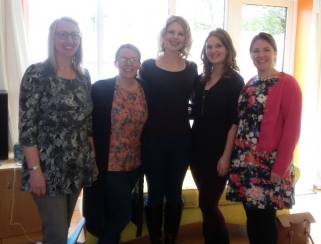Add a comment
Just Peachy Coaching
‹-- PreviousNext --› Continuing the contest-preparation season, I had a visit on Monday from Just Peachy quartet, also gearing up to LABBS prelims in June. This is a new quartet in several senses - not only have they been singing together for only 6 months, but only one has previous quartet experience, and two of them are also very new to barbershop singing. It is most exciting to help people at these early stages of their journey!
Continuing the contest-preparation season, I had a visit on Monday from Just Peachy quartet, also gearing up to LABBS prelims in June. This is a new quartet in several senses - not only have they been singing together for only 6 months, but only one has previous quartet experience, and two of them are also very new to barbershop singing. It is most exciting to help people at these early stages of their journey!
(Oh, and for the numerate amongst you, the fifth person is an extra baritone, Helen, who will be kindly standing in so they can compete despite availability difficulties.)
Something I first noticed teaching piano 20 years ago is that when people come along having identified something they’d like help with, they’re often more than halfway there with that particular challenge. The fact they ask about it signals that they are aware of the need for attention and have already been working on it. There may be things that they’ve not yet put their minds to where I can actually make more of a difference.
This was the case on Monday. The quartet came along have identified tempo choices and tempo changes as a particular challenge of one of their songs. And, whilst there were a couple of moments that did benefit from tweaking, they were basically on the case with this.
What emerged as we went on as an area that would yield more profound and longer-term benefits was the ensemble’s unit sound. As singers from the same chorus, they arrived with a mutually compatible approach to how they used their voices, and so produced a sound that was generally well-matched for resonance, balance and expressive shape - they would have no problem entertaining audiences with it. But it was still a sound in which each singer was primarily focused on their own part rather than fully engaged with the whole chord.
So our work moved into opening up the ears, so as to allow that part of the brain that has an intuitive response to harmony do all the micro-managing of the voice. We used a variety of techniques. Duetting, of course, is the foundation of a good ear - and it was interesting how much improvement there was between our first duetted passage and a second maybe an hour later. We also slowed passages down to a single chord at a time, holding each one until it gelled as a unit rather than four separate notes. This is a very challenging exercise when you’re not used to it, as it forces you into a different relationship with musical content from singing in tempo - but I love it because the cognitive effort goes straight into immediate musical growth.
We also spent a while away from the repertoire doing slow ‘lock and ring’ exercises to develop the specific mode of listening that elicits the expanded sound that is the primary hallmark of the barbershop aesthetic. Jean Sutton taught me these exercises in 1997, with my first quartet, and I have used them in my teaching, my coaching and my own ensembles ever since. They speak directly to that bit of the brain that is happy in harmony, and they never grow stale.
The key thing with all ear exercises is to remove complexity to give space for perception in detail. Duetting strips the texture down, and separates out the tasks of listening and singing, so you’re not trying to do both at once. Blocking individual chords gives you time to stop and process what’s going on while you're doing it. Lock and ring exercises also go slowly, and strip the texture down initially to unisons or simple intervals to practice listening to the whole as if from outside, rather from your individual position in the sound.
The process draws attention to the way that listening is a constructive, not a passive, process. It’s not just a matter of the sounds pouring into your ears fully-formed as music - it’s the brain’s job to take those sounds and put them together into sense. Doing this at the same time as singing a line in tempo is a complex task, and like all complex tasks needs to be learned slowly before being executed at speed.
Fortunately, doing this is exceedingly pleasurable, and a great way to get into a state of Flow. So, whilst you may end up after an intensive session feeling like your brain is addled, you also feel more relaxed, more intelligent, and more bonded with your fellow singers. And the music sounds better when you go back into tempo too.












